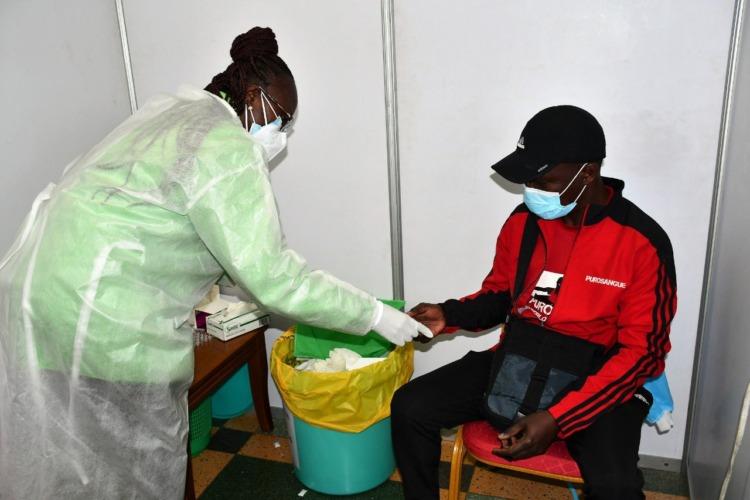- Doses delivered to G20 countries per capita are 15 times higher than doses delivered per capita to sub-Saharan African countries
- Wealthy countries with more supplies than they need have generously pledged to donate these doses to low- and middle-income countries via COVAX but these promised doses are moving too slowly
G20 countries have received 15 times more COVID-19 vaccine doses per capita than countries in sub-Saharan Africa, according to a new analysis.
The analysis, conducted by science analytics company Airfinity, exposes the severity of vaccine inequity between high-income and low-income countries, especially in Africa.
It found that doses delivered to G20 countries per capita are 15 times higher than doses delivered per capita to sub-Saharan African countries, 15 times higher than doses delivered per capita to low-income countries and 3 times higher than doses delivered per capita in all other countries combined.
“Vaccine inequity is not just holding the poorest countries back – it is holding the world back,” said UNICEF Executive Director Henrietta Fore. “As leaders meet to set priorities for the next phase of the COVID-19 response, it is vital they remember that, in the COVID vaccine race, we either win together, or we lose together.”
Wealthy countries with more supplies than they need have generously pledged to donate these doses to low- and middle-income countries via COVAX but these promised doses are moving too slowly. Of the 1.3 billion additional doses countries have pledged to donate, only 356 million doses have been provided to COVAX.
AGRA Launches Initiative to Boost Cold Storage Capacity in Africa, World Economic Forum in Rwanda
African countries in particular have largely been left without access to COVID-19 vaccines. Less than 5 per cent of the African population are fully vaccinated, leaving many countries at high-risk of further outbreaks.
As leaders prepare to meet for the G20 Summit in Rome this weekend, 48 UNICEF Africa ambassadors and supporters from across the continent have united in an open letter. They are calling for leaders to honour their promises to urgently deliver doses, writing that “the stakes could not be higher.”
The letter’s signatories, including Angelique Kidjo, Arlo Parks, Davido, Tendai Mtawarira, Femi Kuti, Tony Elumelu, Ramla Ali, Winnie Byanyima and others, are calling on leaders to donate the pledged vaccines by December, along with the necessary resources to turn the vaccines into vaccinations.
“Every day Africa remains unprotected, pressure builds on fragile health systems where there can be one midwife for hundreds of mothers and babies,” the letter reads. “As the pandemic causes a spike in child malnutrition, resources are diverted from life-saving health services and childhood immunization. Children already orphaned risk losing grandparents. Disaster looms for sub-Saharan African families, four out of five of whom rely on the informal sector for their daily bread. Poverty threatens children’s return to school, protection from violence and child marriage.”
According to WHO, some 80,000 to 180,000 healthcare workers globally are estimated to have died from COVID-19 between January 2020 and May 2021. Less than 1 in 10 healthcare workers in Africa have been fully vaccinated and more than 128,000 have been infected with the virus. The agency has also found only one in seven COVID-19 infections are detected in Africa due to limited testing, meaning the true number is likely much higher.
“Saving lives in Africa starts by saving the lives of the life-savers,” said Fore. “Too many communities on the African continent were already grappling with stressed healthcare systems. They cannot go into another year of this global crisis enduring so many preventable deaths and prolonged sickness.”
In a separate story, the Board of Directors of the African Development Bank has approved an equity investment of $10 million in the ARCH Cold Chain Solutions East Africa Fund (CCSEAF) to support the development, construction and operation of greenfield cold storage, temperature-controlled solutions and distribution facilities in East Africa.
The investment will advance the Fund toward its targeted final close of $100 million by the second quarter of 2022. The Fund’s first close of $30 million occurred in November 2019.
In partnership with conglomerates in the region, the Fund will develop and operate as many as eight cold chain operations in Kenya, Tanzania, Ethiopia, Uganda, and Rwanda to reduce post-harvest losses, and the spoilage of processed food and medicines caused by a lack of temperature-controlled solutions.
Atsuko Toda, the Bank’s Director of Agriculture Finance and Rural Development Department, said “ARCH CCSEAF’s vision to become a regional operator of third-party cold chain logistics services is expected to address the critical issue of post-harvest food loss and food safety hazards in East Africa. Its plan to serve pharmaceutical clients for their storage and distribution of medical supplies is also very timely as the continent continues to tackle the Covid-19 pandemic.”
Ethiopia’s emerging success: How an airline set pace for the global
